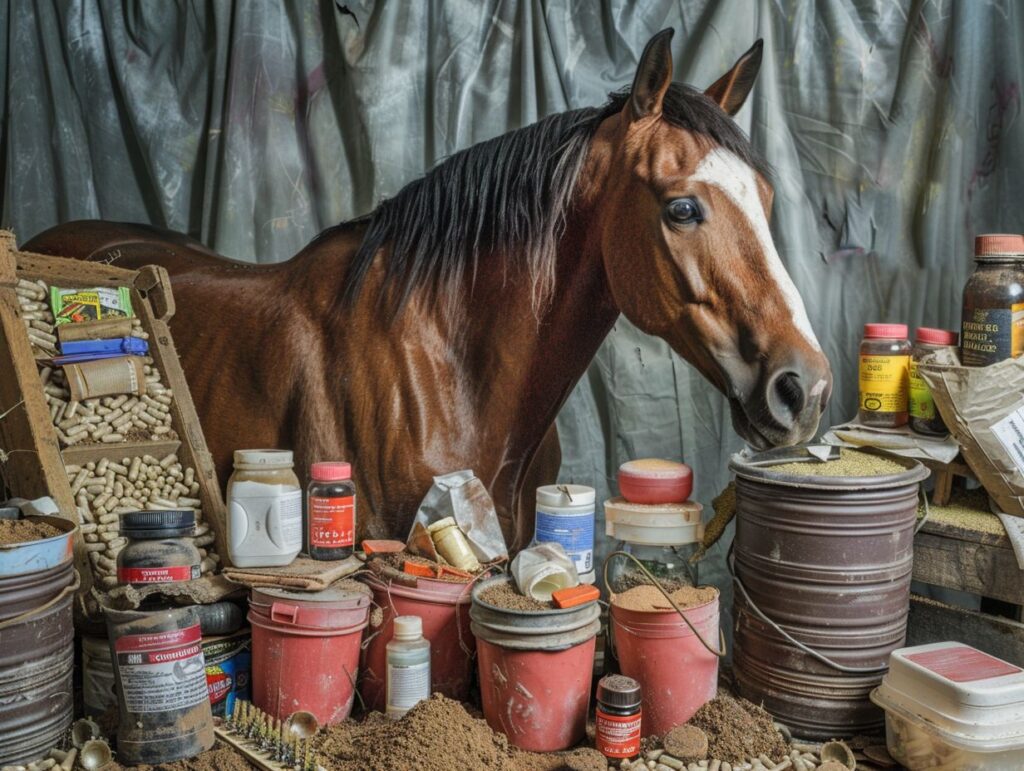Have you ever considered the significance of supplements in a horse’s diet? Different types of supplements are available, each offering various benefits when included in a horse’s feeding regime. However, it is crucial to be aware of the potential risks associated with over-supplementing.
Discover the signs indicating over-supplementation, which can manifest through both physical and behavioral changes in the horse. By understanding these indicators, along with following appropriate dosage and monitoring practices, you can effectively prevent this issue from occurring.
Stay connected to gain further insights into comprehending the world of horse supplements.
Understanding Horse Supplements
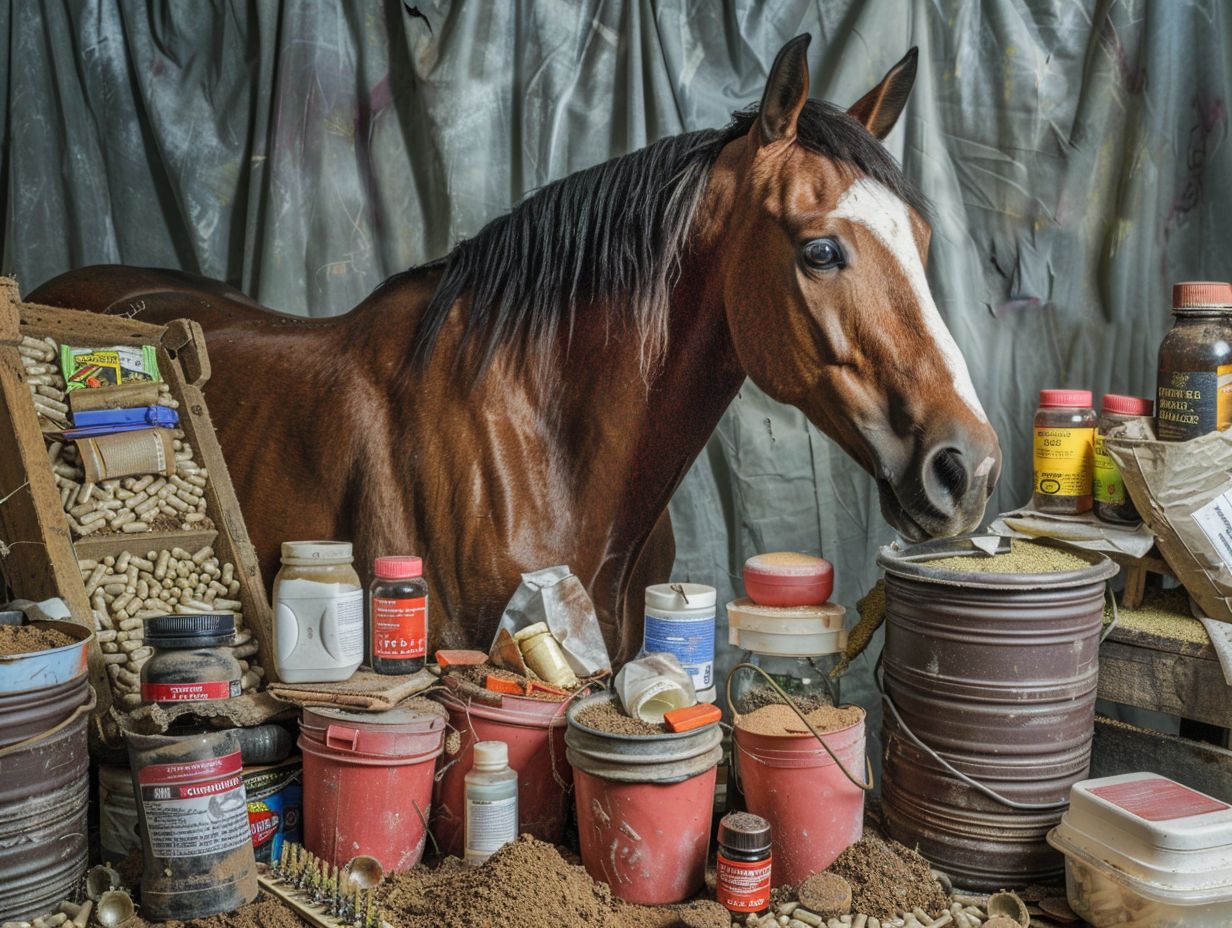
Having a good grasp of horse supplements is essential for maintaining the overall health and well-being of your equine companion. Supplements are instrumental in delivering crucial nutrients that may be deficient in your horse’s diet, guaranteeing they receive adequate nutrition.
Types of Supplements Available
Various types of supplements are available for your horses, ranging from vitamins and minerals to joint supplements, performance enhancers, weight management aids, and those ensuring a balanced diet. Each category of horse supplements serves a specific purpose in addressing their unique needs.
For instance, vitamins and minerals are crucial for overall health and immunity. Joint supplements can enhance mobility and joint health, particularly beneficial for older horses or those engaged in rigorous training. Performance-enhancing supplements might assist in increasing energy levels and aiding muscle recovery. Weight management supplements help in preserving a healthy body condition.
When choosing supplements, it is essential to prioritize quality and reputable brands to ensure effectiveness and safety. Maintaining moderation and balance in supplementation is crucial to prevent over-supplementation and to provide a well-rounded diet for your horse.
Benefits of Supplementing a Horse’s Diet
Supplementing your horse’s diet can yield a variety of advantages, including enhanced muscle development, improved coat health, stronger hooves, optimized digestive system function, boosted metabolism, and a reinforced immune system.
These supplements are specifically formulated to deliver crucial nutrients that may be deficient in your horse’s regular diet, helping to fill any nutritional gaps. By ensuring that your horse receives the proper balance of vitamins, minerals, and other essential elements, supplements can play a significant role in overall health and well-being.
Tailored supplements can assist in addressing specific issues such as joint support, stress management, and performance optimization, ultimately resulting in a happier and healthier equine companion.
Potential Risks of Over-Supplementing
Although supplements offer benefits, it is important to be cautious about over-supplementing your horse. Excessive dosages can result in a range of side effects and health complications that have the potential to affect your horse’s overall well-being.
Side Effects and Health Consequences
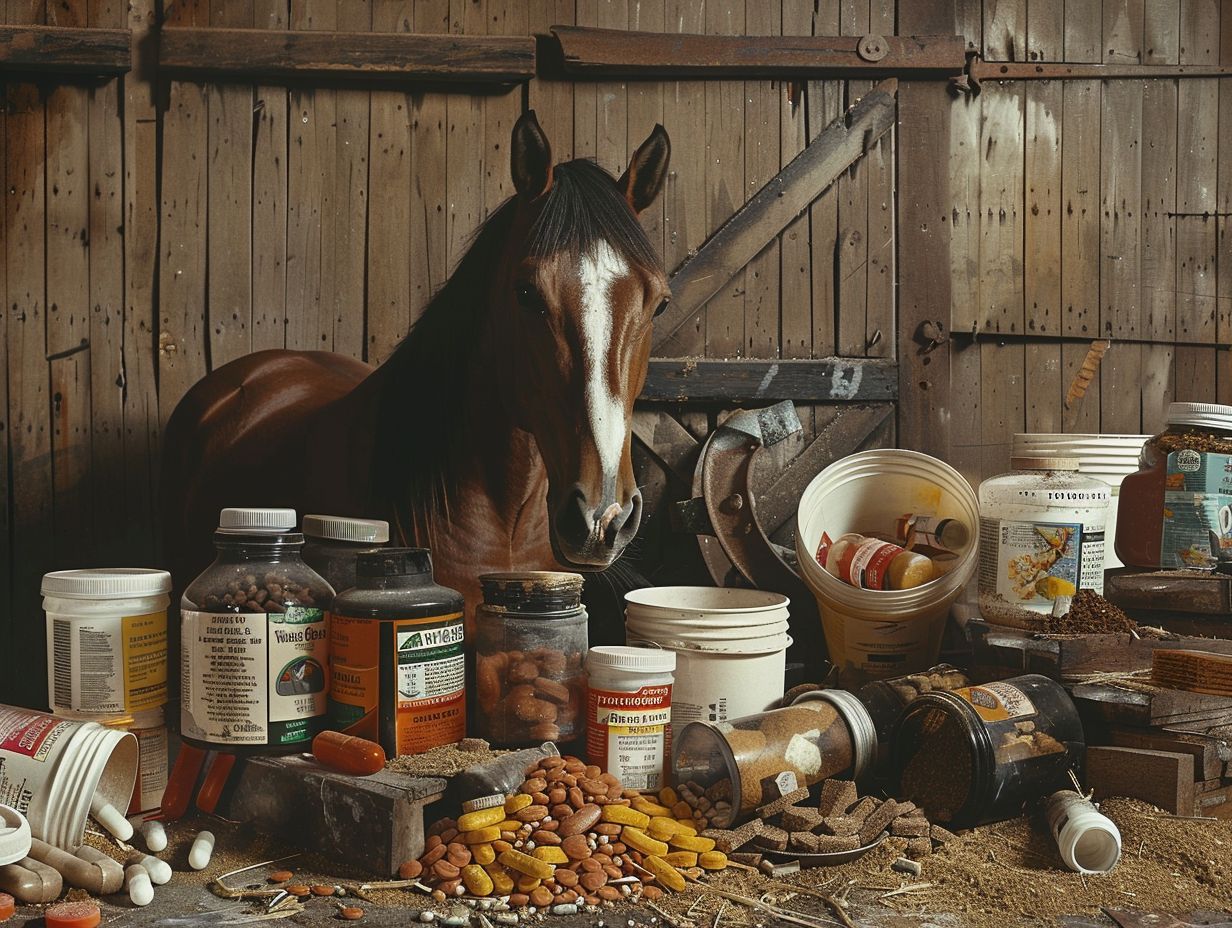
When supplementing horses, it is important to be cautious about overdoing it, as this can lead to various side effects and health issues. These may range from toxicity caused by excessive intake to disruptions in the horse’s body condition.
Excessive supplementation in horses can result in negative effects such as digestive problems, metabolic imbalances, and potential organ damage. Certain vitamins and minerals, like selenium or iron, can be toxic in high amounts and have detrimental effects on the horse’s liver, kidneys, and overall health. It is vital for horse owners to closely monitor the dosage of supplements, adjusting them according to the individual needs of the horse and ensuring they are balanced with the horse’s regular diet. Before introducing any new supplements, thorough research and consultation with a veterinarian are necessary to mitigate potential health risks.
Signs of Over-Supplementation
Recognizing the signs of over-supplementation in horses is crucial for maintaining their health and well-being. Monitoring your equine’s symptoms, body condition, and behavior can offer valuable insights into potential issues.
Physical and Behavioral Indicators
Physical and behavioral indicators can provide valuable insights into over-supplementation in horses, indicating changes in their body condition, welfare, and overall management. These indicators may present as physical symptoms, such as fluctuations in weight, a lackluster coat, hoof issues, or behavioral changes like irritability, nervousness, or reduced appetite.
It is essential for horse owners and caretakers to meticulously observe these signs, as they may signify excessive supplementation, which can negatively impact the horse’s health and performance. Understanding the unique requirements of each horse and seeking advice from equine nutritionists or veterinarians are essential steps in achieving balanced supplementation and ensuring optimal equine welfare.
Preventing Over-Supplementation
Preventing over-supplementation in horses necessitates strict adherence to particular guidelines, monitoring dosage levels, consulting with professionals, and adjusting supplement intake as necessary to guarantee proper care and nutrition.
Guidelines for Proper Dosage and Monitoring
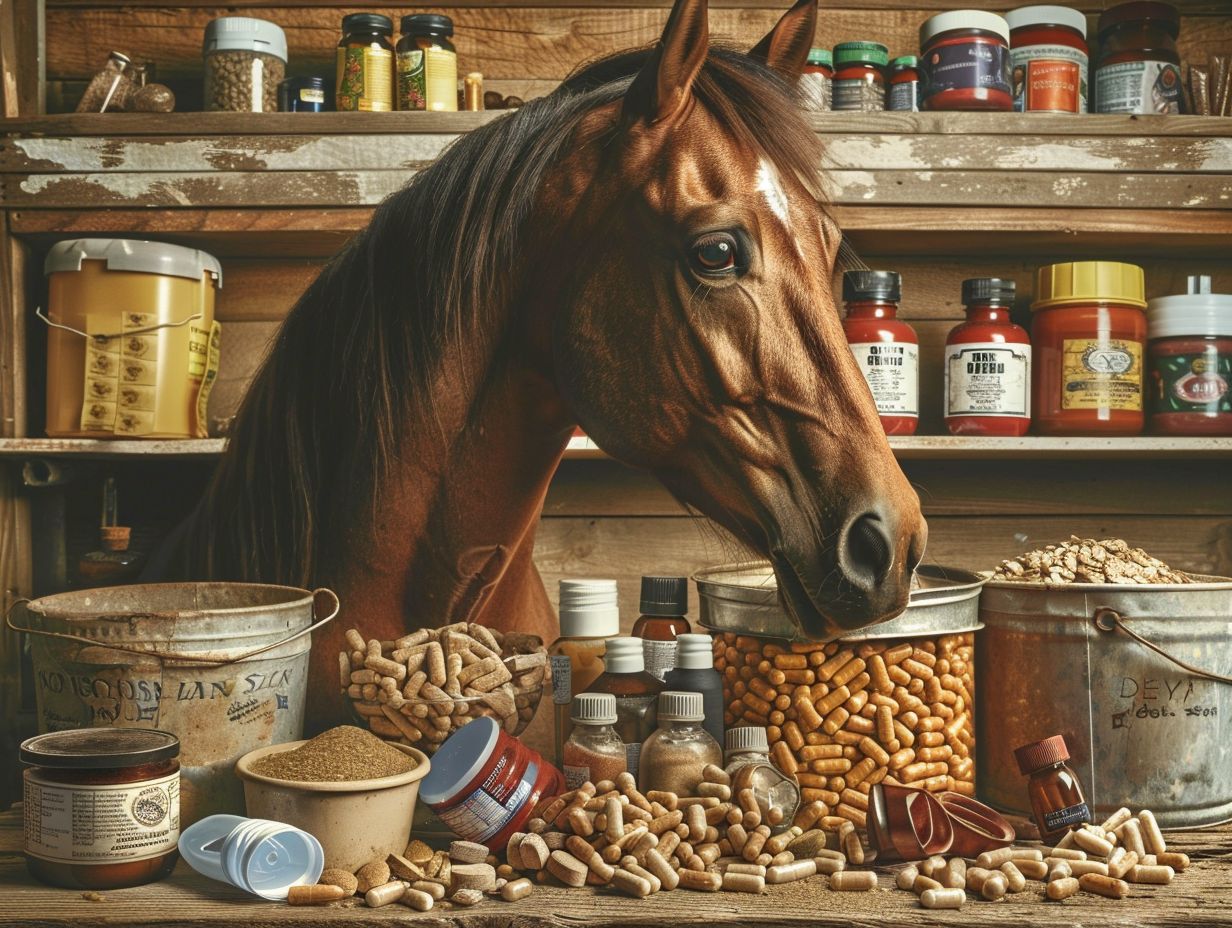
Establish guidelines for the proper dosage and monitoring of horse supplements is essential for ensuring their effectiveness while minimizing risks and potential long-term effects on equine health.
Tailoring the dosage to each horse’s specific needs and considering factors like age, weight, activity level, and health condition can optimize the benefits of supplementation. Regular evaluation of the horse’s response to the supplements is crucial to ensure that the dosage remains appropriate over time. Quality control is paramount when selecting supplements, as substandard products may not deliver the intended results and could even pose health risks. Compliance with regulatory standards and thorough understanding of labeling information are key to safe and effective supplementation practices.
Frequently Asked Questions
Can you over supplement a Horse?
Yes, it is possible to over supplement a horse. Just like with humans, too much of a good thing can be harmful. It is important to carefully monitor and regulate the amount of supplements given to a horse.
What are the risks of over supplementing a horse?
Over supplementing a horse can lead to a variety of health issues including vitamin and mineral imbalances, kidney and liver problems, and digestive upset. It can also be a waste of money as the extra supplements may not be absorbed or utilized by the horse.
How do you avoid over supplementing a horse?
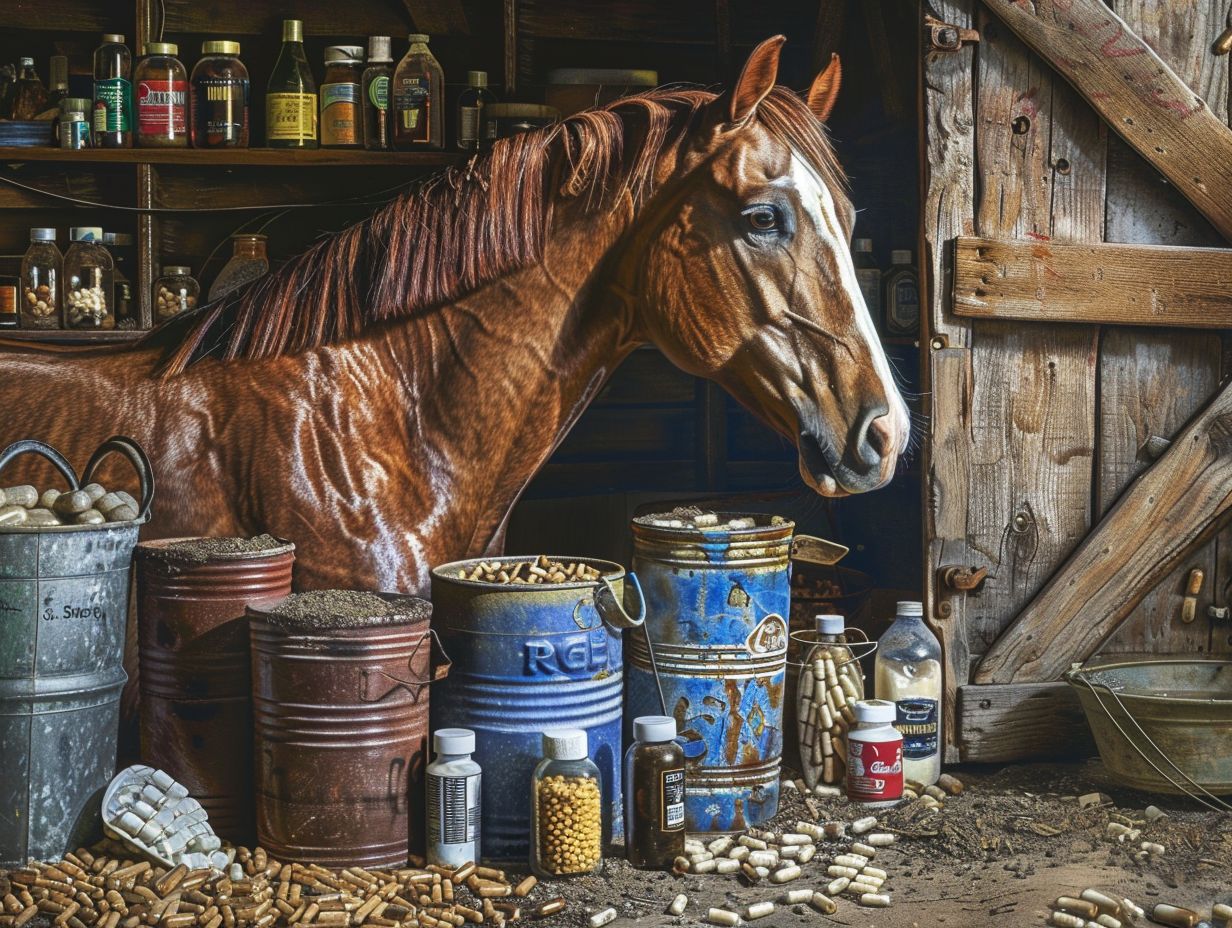
The best way to avoid over supplementing a horse is to consult with a veterinarian or equine nutritionist. They can assess the horse’s individual needs and provide recommendations for appropriate supplements and dosages.
Can over supplementing a horse cause performance issues?
Yes, over supplementing a horse can actually lead to decreased performance. Too much of certain nutrients can cause excess energy or aggression, making the horse difficult to handle or ride. It can also cause weight gain or other health issues that can impact performance.
What are some signs that a horse may be over supplemented?
Signs of over supplementing a horse may include changes in behavior, such as increased irritability or restlessness, as well as changes in physical appearance, such as weight gain or a dull coat. Regular blood work and consultations with a veterinarian can also help identify any imbalances or issues caused by over supplementing.
Can you under supplement a horse?
Yes, it is possible to under supplement a horse as well. Different factors, such as age, breed, workload, and health conditions, can all impact a horse’s nutritional needs. It is important to regularly assess and adjust a horse’s supplement regimen to ensure they are receiving the appropriate amount and type of supplements for their individual needs.
